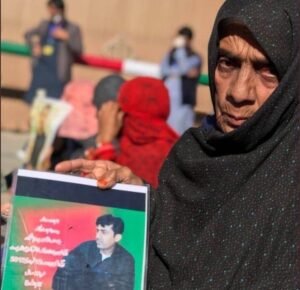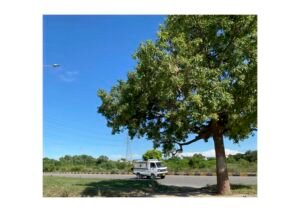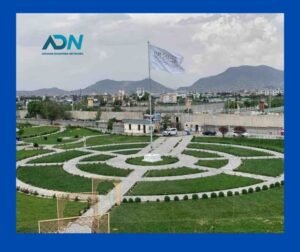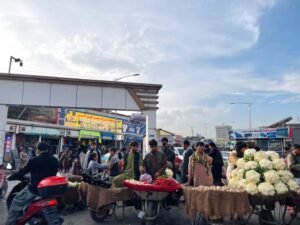Why the World Should Join the Baloch People on Baloch Genocide Remembrance Day?
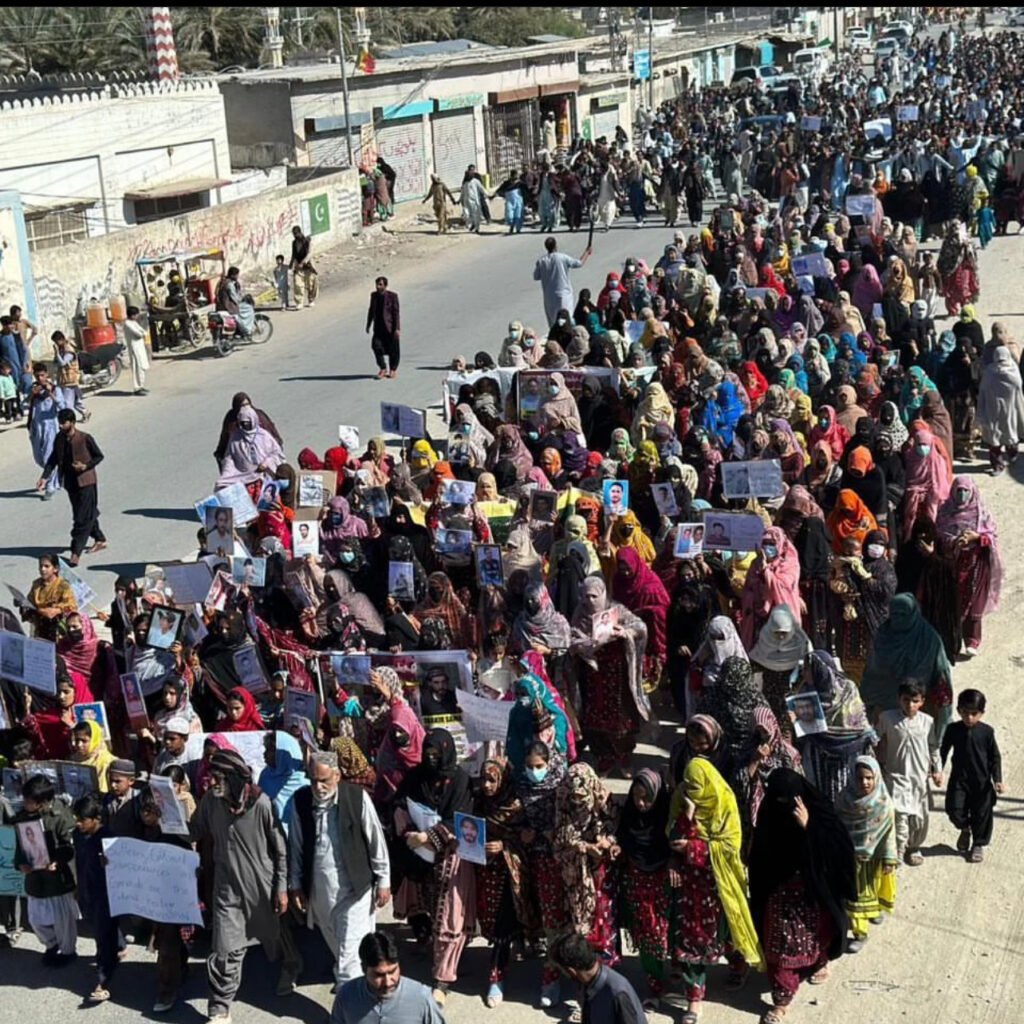
Protest against enforced disappearances in Balochistan.
By Kadeem Baloch
The Baloch Yakjehti Committee (BYC), a civilian group, has called to mark January 25 as the ‘Baloch Genocide Remembrance Day’.[1] On this day in 2014, a mass grave of almost 200 Baloch people who were victims of enforced disappearances was discovered in Balochistan’s Khuzdar district. To hide the state-sponsored genocide of Baloch people from the international community, the Pakistani authorities hastily “resealed” the grave without identifying the victims or conducting DNA tests on their bodies.[2] It has been over a decade since that incident. However, no justice has been served to the victims and their families.
On the contrary, the Pakistani state repression of the Baloch people has increased exponentially, especially after the official commencement of the Pakistan Economic Corridor (CPEC) in 2015. Unfortunately, the international community has not yet recognized the plight of the Baloch people, as they have taken the cause of the repressed Uyghur community in China.
Nevertheless, Baloch groups like BYC are making significant efforts to highlight the ongoing “genocide” of the people in Balochistan. Despite the lack of mainstream media coverage of Baloch protests in Pakistan, the province’s human rights activists and civil society organizations are utilizing social media to share their situation with the world.
As a result, Baloch activists such as Dr. Mahrang Baloch, Sammi Deen Baloch, and others are finally receiving some international recognition for their efforts. However, the world can no longer ignore the ongoing atrocities against the Baloch population in Pakistan and should urgently reach a consensus on the issue.
The West’s historically biased approach to the Baloch issue can no longer be accepted, or the ethnic minority will face state-sponsored genocide in Pakistan.
Mahrang Baloch, the central organizer of the BYC Committee, has recently called for Baloch unity in the face of what she described as “repressive state policies” and ongoing atrocities in Balochistan. Emphasizing the systemic repression that affects not only men but also women and children in Balochistan.
Mahrang stated, “Simply put, the Baloch people cannot live freely in their homeland.”[3]
Balochistan’s Struggle for Autonomy
Since Pakistan forcefully acquired the province in 1948, Balochistan has experienced numerous uprisings fighting for autonomy and independence. Consequently, the province witnessed its First Uprising, which lasted until 1948. Over the next three decades, Balochistan revolted in three additional uprisings: from 1958 to 1959, 1963 to 1967, and 1972 to 1977.[4] These uprisings were responses to Islamabad’s interference in Balochistan’s autonomy.
Furthermore, in the 2000s, new Baloch armed groups were created to ‘liberate’ Balochistan. Still, they failed to gain traction until the 2005 rape of Doctor Shazia Khalid by Pakistani military officers in the town of Sui.[5] However, the most significant event that galvanized Baloch separatism was the 2006 killing of veteran Baloch leader Akbar Khan Bugti during a military operation.[6]
The militarization, harassment campaigns, zero-tolerance policy, and “kill-and-dump” tactics enacted by General Pervez Musharraf’s regime have been continued by successive governments in Pakistan.[7]
To further complicate matters in Balochistan, China and Pakistan entered a deal to develop Gwadar into a deep-water seaport, and a fundamental part of the Belt and Road Initiative (BRI) is divisive.[8] It has highlighted the deep-seated inequality between Baloch people and Islamabad.
Many Baloch people view the Chinese mega-infrastructure projects in the province as examples of contemporary colonialism and exploitation.[9] Last year, numerous instances of racial profiling, targeted violent attacks and enforced disappearances affecting Baloch individuals, including fabricated cases against well-known Baloch activists, were recorded.
More significantly, in July, a large civilian protest titled ‘Baloch Raji Muchi’ (Baloch National Gathering) was held in Balochistan to voice concerns about enforced disappearances, racial profiling of the Baloch population, and the lack of access to local resources, particularly in Gwadar. Barbed wires have been installed in the Port area of Gwadar, restricting locals, mainly fishermen, from entering these zones.
The local community is made to feel “homeless” in their own homeland due to the state-sponsored racial profiling of the Baloch ethnic minority.
Mahrang Baloch and Sammi Deen Baloch are the main faces of the new phase of the “non-violent” Baloch uprising against the repressive rule of the Pakistani military establishment.[10] They spearheaded civilian protests last year and are at the forefront of the January 25 ‘Baloch Genocide Remembrance Day’ gathering in Dalbandin, Balochistan.
Crackdown on Baloch Mobilization
For weeks, thousands of Baloch nationals gathered in different cities and towns of the province during the ‘Baloch Raji Muchi’ gathering in July-August 2024, with the coastal city of Gwadar as the movement’s epicenter.[11] Authorities blocked roads leading to Gwadar, suspended internet and cellular services in and around Gwadar, deliberately making it difficult to share real-time updates, and eventually used heavy force to end the protest.[12]
Fearing a similar turnout at the January 25 gathering, Pakistani authorities have already started imposing a series of restrictions.[13] On January 18, over two dozen BYC leaders and workers were arrested when Karachi police launched a violent crackdown and manhandled those attending the peaceful march, mostly women. BYC members, including Lala Wahab Baloch, Sammi Deen Baloch, Fouzia Baloch, and Amna Baloch, were “illegally arrested” by the police.
Reports indicate that Sammi Deen was harassed in police custody and even “escaped an assassination attempt.”[14]Mahrang issued a video statement condemning the police’s violent actions and accusing them of having “attacked Baloch pride and dignity by laying hands on the veil of Baloch women.”
Amnesty International also condemned “the heavy-handed crackdown” during BYC’s peaceful mobilization campaign.[15]
To stop the Baloch mobilization for the January 25 gathering in Dalbandin, police have also registered an FIR against Mahrang, and several other BYC workers under spurious charges.[16] While this brazen crackdown is going on against the peaceful Baloch people, the international community has so far remained silent. This attitude needs to change, or Pakistan’s military establishment, in cahoots with the Chinese government, will continue to trample over the basic human rights of the Baloch population violently. More importantly, the United Nations should make Islamabad accountable for its repressive actions, with a terrible human rights record, in Balochistan as Pakistan became a temporary member of the UN Security Council for the next two years.[17]
The author chooses a pseudonym. Kadeem Baloch is a freelance journalist based in Pakistan.
Note: The contents of the article are of sole responsibility of the author. Afghan Diaspora Network will not be responsible for any inaccurate or incorrect statement in the articles.
[1] https://x.com/BalochYakjehtiC/status/1880578330203754674
[2] https://x.com/BalochV4Justice/status/1880869864535110088
[3] https://balochwarna.com/2025/01/18/dr-mahrang-baloch-urges-baloch-nation-to-unite-against-baloch-genocide/
[4] https://www.iar-gwu.org/print-archive/8er0x982v5pj129srhre98ex6u8v8n
[5] https://www.theguardian.com/world/2005/feb/21/pakistan.declanwalsh
[6] https://herald.dawn.com/news/1153862
[7] https://www.petertatchellfoundation.org/pakistan-terror-campaign-in-balochistan/
[8] https://journals.sagepub.com/doi/full/10.1177/1879366520901920
[9] https://www.dw.com/en/gwadar-why-is-pakistan-fencing-chinas-belt-and-road-port/a-56026436
[10] https://time.com/7071983/mahrang-baloch-pakistan-prevented-from-traveling/
[11] https://thefridaytimes.com/29-Jul-2024/hundreds-of-protesters-overcome-hurdles-for-baloch-raji-muchi-gathering-in-gwadar
[12] https://www.amnesty.org/en/latest/news/2024/07/pakistan-repeated-punitive-crackdowns-on-baloch-protests-must-end/
[13] https://thebalochistanpost.net/2025/01/pakistani-authorities-tighten-restrictions-ahead-of-baloch-genocide-remembrance-day/
[14] https://www.dawn.com/news/1886109/karachi-police-arrest-25-baloch-yakjehti-committee-protesters-during-lyari-march
[15] https://x.com/amnestysasia/status/1880877460675567916
[16] https://www.dawn.com/news/1885789/fir-registered-against-bycs-mahrang-over-50-others
[17] https://news.un.org/en/story/2024/06/1150726





